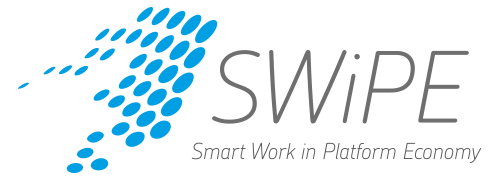The Finnish permanent representation to the European Union provided a forum for SWiPE’s morning coffee event organised for the stakeholders in Brussels. SWiPE researchers Anne Kovalainen, Seppo Poutanen and Kaisa Hytönen presented SWiPE’s current news and recent research findings to members of the European Parliament, their assistants, the experts of EU representation and representatives of Finnish associations in Brussels. On behalf of the Finnish permanent representation, the event was hosted by Kim FYHR, responsible officer.
Among other things, the current research findings show that the line between work and free time is lost in expert work and workers on platforms require support and training in time management. A study made in cooperation with Akava (Confederation of Unions for Academic Professionals in Finland) showed, that digitalisation is a natural part of the work of employees with higher education. The findings show that digital tools and technology was believed to improve the position of the person in the job market.
In addition, the recent research findings by SWiPE researchers of ETLA (Research Institute of the Finnish Economy) on how Finland suffers a chronic lack of commercialisation of research findings created discussion.
SWiPE researched also reported on the study conducted in collaboration with Kone Elevators Ltd, that company-driven training is at its best able to provide flexible ways to train employees and give individuals good skills to build a sustainable working career.
In a lively debate was also pondered, whether a platform worker is an entrepreneur, employee or something in between. The platform work was believed to be increasing in the future, even in the case of non-high education people, which would increase the involvement of work-related capacities, both in legislation and in education, for example.
The researchers were also encouraged to bring out clear visions on what is expected from the EU level during Finland’s Presidency of the European Union from the point of view of research results and what needs to be highlighted, for example in the field of artificial intelligence.

